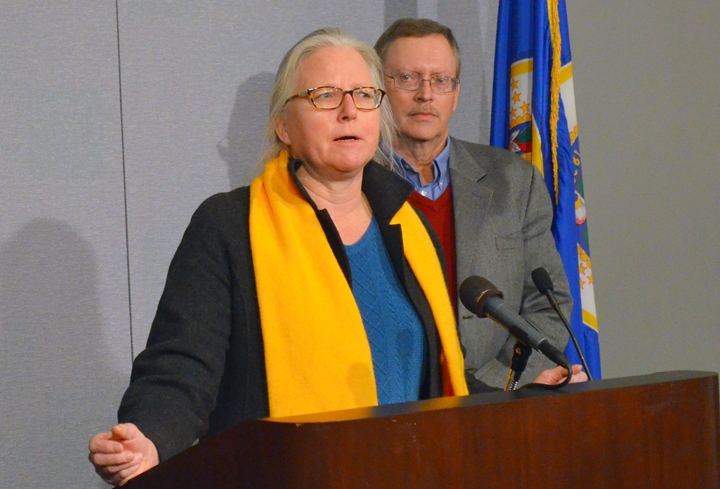

Share
Jennifer Christensen’s career with the United Food and Commercial Workers started over 30 years ago as a part-time deli worker at Cub Foods, and it will end this month, when she retires as president of South St. Paul- and Duluth-based UFCW Local 1189.
She was the first woman to serve as president of the 10,000-member local, which represents workers in retail stores, nursing homes, hospitals, food processing plants, the state’s medical cannabis industry and beyond.
But in this interview, which has been edited for length and clarity, Christensen said she preferred to focus not on “the girl thing,” but on the work that has made Local 1189 a successful, fighting union with a bright future.
UA: What drove your interest in union leadership?
JC: When I went to work in the Cottage Grove deli part time, I set out in my mind to get the store director’s job. Then I got a full-time promotion working seafood when the Apple Valley store opened, and SuperValu paid for me to finish my degree. And I had for some time been trying to be a union meatcutter – I wanted to be a carpenter when I was younger, and being a meatcutter was almost like being a carpenter, only you took things apart rather than putting them together – and I finally got a job as a meatcutter apprentice when they opened the Midway store…
But before I became a meatcutter, I was on the negotiating committee of a different local in 1995… After that experience, I decided right then and there that if I ever got a chance to run a local, I would never run it that way!
UA: Eventually you got your chance, getting elected secretary-treasurer in 2003 and president in 2016. Did you stay true to that approach?
JC: I strongly believe that workers will always make the right decision for themselves, their families and even their employer – if they’re given true and honest information. Workers are smart, and regardless of how long they’ve been there or what wage they make, you need to respect their intelligence. It’s their workplace. It’s their union. That’s been the driving factor for me, taken from those experiences I had along the way.
UA: What have you learned about leadership?
JC: To purposefully take time to thank people and appreciate people and have conversations and build solidarity. Sometimes we keep calling on the same people, and we’re wearing people out. We need to find the joy in solidarity. The struggle is long. Stop and have a drink of water. Have a beer. And then go on.
UA: Local 1189 represents such a diverse group. How would you characterize your local’s identity?
JC: I find that the more we learn about each other and our neighbors, the stronger we are. Because we are a diverse local, we have in our culture that we support people in other industries. It’s not all about us! We are really dedicated, as a union, to everyone doing better.
Local 1189 and President Jennifer Christensen hosted a food giveaway in South St. Paul earlier this year.

UA: How has Local 1189 navigated COVID?
JC: The vast majority of our members are essential. Our members had to face the pandemic every day, head on. And we’re all fortunate that they are professionals and committed to what they do, so they did show up every day. They stayed. They worked. People adjusted their lives in order to rise to the challenge, even if it was scary. They’re heroes.
It took and is taking a toll. But we as a union did not let them go through that alone. We continued to come to work. We worked to make sure that the union representatives of essential workers were also essential, so that we could stand beside them, getting information out to people, making ourselves available, providing our members with masks or face shields…
UA: There was an outpouring of appreciation at the start of the pandemic for the essential work we too often take for granted. Do you think that will last?
JC: We all want to get back to normal, and some of normalcy is the ability to take things for granted like going to the grocery store and finding food and toilet paper. Our folks, we’ve always known what an integral part of the community they are. Everyone else found out, and I think from time to time we’ll all kind of remember still.
UA: What are you going to miss in retirement? And what are you looking forward to?
JC: I’ll miss being able to give people answers, giving people the right information. I will miss my staff and friends in the labor community. I’ll miss seeing the accomplishments we make as unions and being part of it, watching people grow in their power.
I’m going to do some pottery. I don’t know that I look forward to weeding my garden, but my garden might be looking forward to that.

